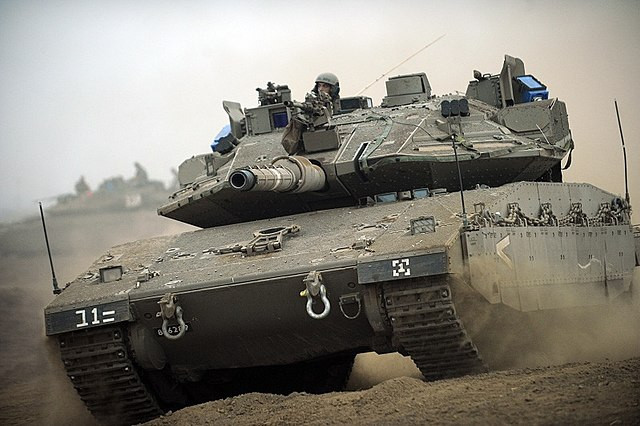Israeli tanks advanced into the heart of Rafah on Tuesday, marking a significant escalation in the ongoing ground offensive in southern Gaza. Witnesses reported that tanks and armored vehicles equipped with machine guns were spotted near the Al-Awda mosque, a central landmark in Rafah. This move comes three weeks into an offensive that has drawn widespread international condemnation due to its severe impact on civilians.
The Israeli military confirmed that its forces were operating in the Rafah area but did not comment on specific advances into the city center. Overnight, Israeli forces intensified their bombardment of Rafah with airstrikes and tank fire, despite global outcry over a recent attack that resulted in a devastating blaze in a tent camp, killing at least 45 Palestinians, more than half of whom were children, women, and the elderly.
International leaders have expressed horror at the attack in a designated "humanitarian zone," urging the implementation of a World Court order to halt Israel's assault. In a related move to curb the violence, Spain, Ireland, and Norway announced their formal recognition of a Palestinian state, hoping to accelerate efforts towards a ceasefire in the conflict, which has now entered its eighth month and devastated much of Gaza.
Residents in Rafah's Tel Al-Sultan neighborhood, where Sunday's deadly strike occurred, reported ongoing shelling. "Tank shells are falling everywhere in Tel Al-Sultan. Many families have fled their houses in western Rafah under fire throughout the night," one resident told Reuters via a chat app. The United Nations Relief and Works Agency (UNRWA) reported that around one million people have been displaced by the Israeli offensive in Rafah since early May.
A video obtained by Reuters depicted families carrying their belongings through Rafah's shattered streets, their children trailing behind them. "There are a lot of attacks, smoke and dust. It is death from God...The [Israelis] are hitting everywhere. We're tired," said Moayad Fusaifas, pushing along belongings on two bicycles.
Since taking control of the Rafah border crossing with Egypt three weeks ago, Israeli tanks had mainly operated on the outskirts and in some eastern districts. However, recent days have seen a thrust towards western neighborhoods, with tanks taking positions on the Zurub hilltop in western Rafah. Witnesses reported gunbattles between Israeli troops and Hamas-led fighters in the Zurub area.
In central Rafah, witnesses noted the use of remote-operated armored vehicles by the Israeli military, with no immediate sign of personnel around them. An Israeli military spokesperson did not provide comments on these reports but confirmed ongoing operations along the Philadelphi Corridor, which separates Gaza from Egypt, based on intelligence about terror targets.
The Israeli military stated that its troops were engaged in close-quarter combat, locating tunnel shafts, weapons, and militant infrastructure. Despite a ruling by the International Court of Justice ordering it to stop, Israel has continued its offensive, arguing that the ruling allows some scope for military action.
Gaza's health ministry reported that more than 36,000 Palestinians have been killed since the beginning of Israel's offensive. Israel launched its air and ground war after Hamas-led militants attacked southern Israeli communities on October 7, resulting in the deaths of around 1,200 people and the capture of over 250 hostages, according to Israeli tallies.
Israel maintains that its objective is to root out Hamas fighters in Rafah and rescue hostages believed to be held in the area. Since Sunday's strike on the tent camp, at least 26 more people have been killed by Israeli fire in Rafah, according to health officials in the Hamas-run enclave.
In the northern Gaza Strip's Jabalia area, Israeli forces have been engaged in fierce fighting with Hamas and Islamic Jihad fighters, residents reported. In some residential districts from which Israeli forces have retreated, civil emergency teams have been recovering bodies from the ruins.




